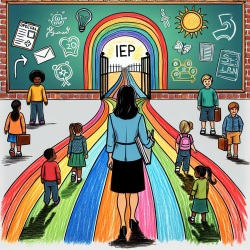Introduction
In the realm of speech-language pathology and online therapy, staying informed about current research is crucial for delivering effective interventions. A recent study titled HIV and incarceration: prisons and detention offers insights that can be translated into improving online therapy practices for children in schools. This blog will explore how practitioners can implement the outcomes of this research to enhance their skills and encourage further investigation.
Understanding the Research
The study highlights the high prevalence of HIV among prisoners and the associated risk behaviors and transmission within prison environments. It emphasizes the effectiveness of interventions such as condom distribution, needle and syringe programs, and opioid substitution therapies in reducing HIV risk behaviors. These findings underscore the importance of comprehensive programs that include education, voluntary testing, and treatment provision.
Applying Research Insights to Online Therapy
While the context of prisons may seem distant from online therapy for children, the underlying principles of data-driven decision-making and intervention effectiveness are universally applicable. Here are some ways practitioners can apply these insights:
- Comprehensive Assessment: Just as the research advocates for comprehensive programs, online therapy should begin with a thorough assessment of a child's needs. This ensures that interventions are tailored to address specific challenges effectively.
- Evidence-Based Interventions: The success of interventions in the study is attributed to their evidence-based nature. Similarly, online therapy should utilize interventions backed by research to ensure efficacy and positive outcomes for children.
- Continuous Monitoring: The study highlights the importance of monitoring interventions to ensure their effectiveness. In online therapy, regular progress monitoring allows practitioners to adjust strategies as needed, ensuring optimal outcomes.
- Education and Empowerment: Education is a cornerstone of the study's interventions. In online therapy, educating children and their families about the therapy process and goals empowers them to be active participants in their progress.
Encouraging Further Research
Practitioners are encouraged to delve deeper into the research and explore its implications for their practice. By staying informed about current studies and integrating new findings into their work, practitioners can continually enhance their skills and contribute to the field's advancement.
Conclusion
The insights from the study on HIV and incarceration offer valuable lessons for online therapy practitioners. By embracing data-driven decisions and evidence-based interventions, practitioners can improve outcomes for children in schools. To read the original research paper, please follow this link: HIV and incarceration: prisons and detention.










